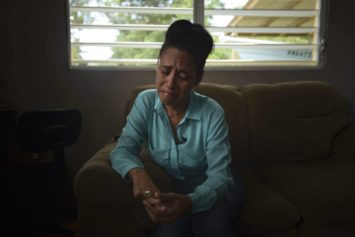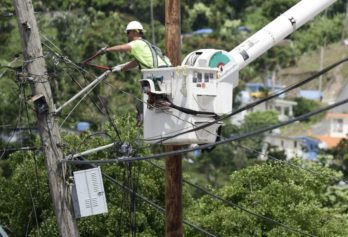During the height of this year’s hurricane season, two Category 5 hurricanes ripped through the U.S. Virgin Islands. Storms Irma and Maria — packing winds of more than 170 miles per hour — dismantled large swathes of the infrastructure and upended the lives of the 106,000 residents of St. John, St. Thomas and St. Croix.
The hurricanes tore roofs and walls off homes, hospitals, schools and other structures. Floods overwhelmed roads and homes. Fierce winds picked up boats and ocean vessels and tossed them like toys onto beaches and streets. Power lines, transformers and other parts of the electrical grid were left in shreds as trees were snapped like toothpicks.
Several residents who had survived other hurricanes, including Hugo in 1989 and Marilyn in 1995, said Maria was easily the worst they experienced, describing the aftermath as a resembling a “nuclear winter” and looking as if a bomb went off in the middle of the islands.
While the physical infrastructure of the territory was rearranged by the hurricanes and is in the process of being repaired, the next concern for Gov. Kenneth Mapp and Rep. Stacey Plaskett — the territory’s delegate to Congress — as well as economists and other observers, is the precarious nature of the island’s finances. Well before these recent killer storms, the territory’s financial situation was dire.
A delegation of Virgin Islands officials have gone to Congress, testified and asked for help. Congress recently released some monies, but Gov. Mapp said that long-term the Virgin Islands will need $7.5 billion from the federal government to stabilize and rebuild. Congress offered the VI government a $500 million federal disaster loan, but they’re demanding that the loan receive priority (primary lien position) over other debt. The government has already given such position to other bondholders, meaning that to accept the federal government terms would violate other agreements leading to lawsuits and financial turmoil for the government.
According to Standard & Poor’s, the USVI’s gross domestic product for 2015 was $3.77 billion. The territory has a $2 billion debt load — a per capita debt of almost $20,000 per person — and it is also saddled with an unfunded liability of about $3.8 billion, money owed to retired government employees. In addition rating agencies Fitch and Moody’s recently downgraded the territory’s gross receipts and matching fund bonds to junk status. This development has deepened the territory’s financial woes as the governor and his economic advisers contemplate floating bonds to close a $110 million structural budget gap.
Yet as dire as the situation appears, there are those like James Fleming who see this as a moment to press reset.
“The amount of debt is HUGE. There’s not a lot of ways out and little space to maneuver,” said Fleming, who grew up in St. Thomas and served as adviser to the governor and director of the Financial Development Unit of the Eastern Caribbean Central Bank. “I heard someone say that at this point it [the economy] has to collapse. When you’re in a situation like this, it’s] you’re like this going from crisis to crisis and from exogenous shock to exogenous shock, which is the hurricane. This is an opportunity to reset because things are not normal.”
The reset Fleming and others described includes a complete revamping of the territory’s number one product, tourism, including emphasizing customer service, eliminating inefficiencies and other issues in the industry and building heritage tourism.
They said policymakers, business people and elected officials should really concentrate on directing capital investment to entrepreneurship and developing human capital, and indigenous know-how, creating training opportunities and using a palette of incentives and inducements to attract and keep native-born Virgin Islanders.
VI Department of Labor Commissioner Albert Bryant said Virgin Islanders need to “look back at future opportunities.”
“The Virgin Islands can thrive and survive if it depends almost solely on tourism,” he said. “Right now, the majority of the VI’s major hotels won’t be available until 2019. That is an opportunity for people to go other places. There are tons of underutilized resources in the form of airports, seaports, and other buildings. In addition, we have a $120 million fiber optic ring that connects us to the world.”
“As land gets scarce, the sea becomes a better option. We have a marine industry that’s active but latent in terms of possibility. Tortola has the largest charter fleet in the world but nowhere to repair those boats. We could establish facilities here to address that need. We need to diversify. We had alumina, watchmaking, light manufacturing and rum distillation but we have to do more. We could be the first ‘smart island’ in the Caribbean, wrapping the best of our heritage with technologies of the future. Cybersecurity, networking, those things will be important for our children.”
Fleming and Kenrick Isaac, a business development and economic consultant who grew up in St. Thomas, were critical about the work ethic and laxness among workers, particularly those in government, and argue that if the VI ever hopes to become competitive globally there has to be a shift in people’s thinking and actions.
“It’s about training people. When you go to places like Jamaica or B’does, they don’t care if you’re white, black or Chinese,” said Isaac. “Their service is bar none. In St. Thomas, customer service is a problem. They don’t care. To me, it’s ter-ri-ble. How are you going to be in the service industry and have no exemplary customer service? It’s just amazing and pervasive. If you don’t have it in tourism, where else will you have it?”
None of the ideas and solutions would necessarily protect Virgin Islanders from the ravages of hurricanes, but if enacted would provide stability over the long haul, they said.
Interviewees expressed a generalized dissatisfaction with VI government and were particularly critical of elected leaders who seem more concerned with getting back in office than planning long term.
“To me this is an opportunity for a clean [slate],” Isaac said. “But we have people without vision who will patch things back up with band-aids. There needs to be a plan. All the senators should be working to revamp government, increase efficiencies, find new ways to lower energy costs and attracting new business. There needs to be a plan.”
Isaac, who has a background in public policy and risk management, said the electoral cycle also doesn’t lend itself to formulating plans 10, 15 or 20 years down the road, because new governors generally scrap plans, policies and projects of their predecessors, and if they only serve one term they won’t have the time to embed their projects or policies.
It helps, Fleming said, that there’s money flowing into the territory in the form of insurance claims, and FEMA and unemployment assistance.
“This money will come in, but the question is how do you utilize that opportunity?” he asked. “Usually, in a case like this it’s hard because you’re trying to race back to have some sense of normalcy, but that’s when you have to fight that desire, press reset, make use of the opportunity and be a little more proactive.” He advises his fellow Virgin Islanders rebuild at a more deliberative, pace and even though the terrain doesn’t lend itself to easily replacing light poles and the electrical grid, the government should look at pursuing alternate forms of energy such as solar and geothermal power, burying power lines, and making sure buildings and structures can withstand hurricanes, as is now commonplace in Japan. “Or else the government will be caught in same cycle of building these roads, building poles and next year you have the hurricane again.”
There is an inertia that clouds substantive forward progress, Fleming said.
“There are a lot of challenges and incompetent management,” he explained. “The VI has developed a dependency mode of operating where everything is tied to government, getting a government job, being focused on government. It’s like Antigua situation with bloated infrastructure and a dicey fiscal situation. They hire multiple people to do a job, dig a hole, fill the hole, empty it and refill it again. It’s just finding a job for people.”
Everyone familiar with the circumstances in the Virgin Islands acknowledges that it will take years for the territory to be restored to good health. That reality is compounded by the exodus of talent and much-needed expertise to the United States, as well as significant numbers of wealthy VI residents who fled after the storms.
“We were visited by two brutal hurricanes in a short period of time. It’s going to take a long time to recover,” said St. Thomas Senator Tregenza Roach. “The destruction to the infrastructure was even more brutal. Ninety to 95 percent of the power grid was destroyed, and a number of hotels have been reduced to rubble.
“It’s like a type of collective anguish that people here are suffering. We were already challenged in so many ways, and then we got two blows in two weeks.”
Sen. Roach, who is serving a third term in the VI Legislature, Fleming and other interviewees agree that the Virgin Islands can no longer lean on the status quo. Currently, the primary economic drivers are tourism, trade, and other services, which account for almost 60 percent of the VI’s GDP and almost half of total civilian employment. The government is the territory’s single largest employer, and about 2 million tourists visit each year.
In the meantime, relief will be hard to come by. Vermont Sen. Bernie Sanders introduced a $146 billion measure to facilitate the rebuilding and modernization of infrastructure in the USVI and Puerto Rico. In a draft of the bill, Sanders allocates $270 million for Puerto Rico and $20 million for the US Virgin Islands for renewable energy and energy efficiency grants for local municipalities and homeowners; $8.55 billion over 10 years for their infrastructure and jobs programs; $34 million to restore clean drinking water and sewage disposal; $200 million for the Department of Veterans Affairs in Puerto Rico and the US Virgin Islands; and the elimination of the cap on general Medicaid funding for U.S. territories. This would be much-needed support, however with the current makeup of the federal government, the US Virgin Islands will have to create its own solutions.


